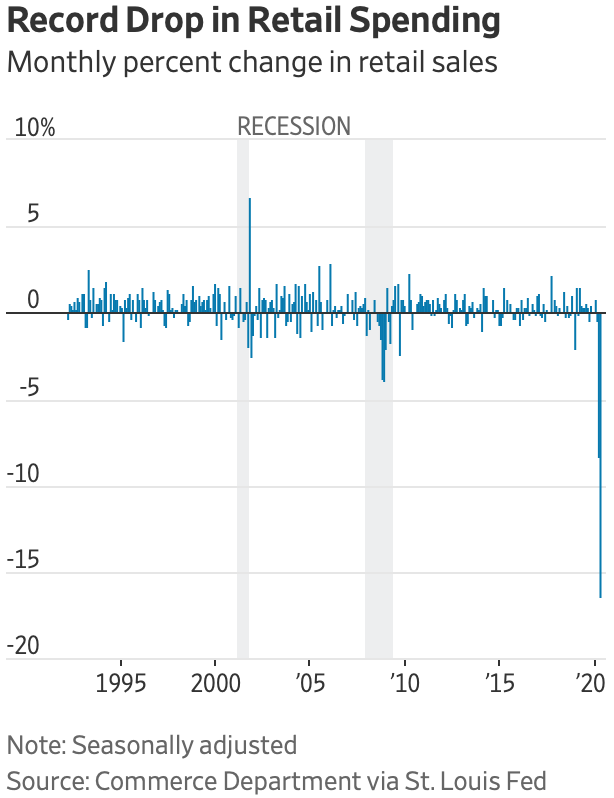Founding Member Rate: Like the newsletter? During this trial period, you get the Founding Member Rate — 50% off the regular cost. Continued thanks to everyone who already has done so!
The World
Retail sales fell a seasonally adjusted 16.4% in April, eclipsing March’s 8.3% drop and marking the steepest month-over-month decline in records dating to 1992. The Federal Reserve said industrial production dropped 11.2% in April, its steepest monthly fall dating back more than a century. (Wall Street Journal)
Meanwhile, U.S. consumer sentiment rose unexpectedly in early May, the University of Michigan’s consumer sentiment survey showed. It also found that social isolation concerns are growing as a major concern about the pandemic. (Reuters)

House Democrats are poised to advance the biggest economic relief package in history at more than $3 trillion. Some macroeconomists say the package could prove too small. (Finance 202)
The employment shock hit women harder than men. April unemployment among women rose to 16.2%, compared with 13.5% for men. In February, the rates were similar at close to 3.5%. The shock also hit lower-income households first, as 39% of former workers living in a household earning $40,000 or less lost work, compared with 13% in those making more than $100,000. (Wall Street Journal, New York Times)
Nearly 27 million people may have lost employer-sponsored insurance due to job losses, according to Kaiser Family Foundation analysis. (HealthcareDive)
Michigan closed its capitol in Lansing on Thursday and canceled its legislative session rather than face the possibility of an armed protest and death threats against Democratic Gov. Gretchen Whitmer. In Los Angeles, hate crimes and incidents directed at Asian Americans have surged. (Bloomberg, Los Angeles Times)
President Donald Trump threatened to cut China ties, stating no interest in speaking to President Xi Jinping because of China's "failure" to contain the disease. (The Telegraph)
China unveiled a plan to facilitate cross-border transactions and investments between Hong Kong, Macau and southern China cities to transform the coastal region into a high-tech megalopolis to rival California’s Silicon Valley. (Bloomberg)
Germany’s economy slumped in the first quarter at its steepest rate since 2009. Italy will allow free movement within the country starting June 3. (Reuters, Bloomberg)
Disney’s “Frozen” will not reopen on Broadway, the first musical to close permanently because of the crisis. (New York Times)
88% of colleges expect declines in international student enrollments this fall. Meanwhile, many universities are pushing to bring students back to campus, pledging to overcome the extraordinary housing and teaching challenges. (Inside Higher Ed, Washington Post)
Economy
OpenTable projects that 25% of U.S. restaurants will go out of business, as nationwide reservations are down 95% from a year ago. (Bloomberg)
U.S. employers remain wary of immunity tests as they move to reopen. Mercer surveyed more than 700 U.S. employers and found only 8% of companies said they would include antibody tests in plans to screen employees. (Reuters)
Democratic senators support a bill requiring major airlines and third-party ticket sellers to offer full cash refunds for all canceled tickets — regardless of whether the airline canceled the flight or the passenger canceled their ticket. (Washington Post)
J.C. Penney made the approximately $17 million interest payment that was due and payable on May 7, potentially one form of J.C. Penney negotiating with its lenders as it explores bankruptcy. (CNBC)
NYC apartment rentals fell 71% in April compared to last year. (Bloomberg)
Technology
Facebook is buying the popular GIF-making and sharing website Giphy reportedly for $400 million, with plans to integrate the massive GIF library into Instagram and other Facebook apps. (The Verge)
The U.S. moved to block shipments of semiconductors to Huawei Technologies from global chipmakers. Meanwhile, Taiwan Semiconductor Manufacturing, the world’s largest contract chip manufacturer, said it would spend $12 billion to build a factory in Arizona. (Reuters, Wall Street Journal)
The pandemic has accelerated call centers’ shift to automation. Firms like IBM and Google are sweetening the incentives, as advances in natural-language processing have dramatically improved. (MIT Technology Review)
NASA is negotiating bilateral agreements with space agencies in other countries, where partner nations would agree to 10 basic norms as part of their space activities. (ArsTechnica)
Smart Links
20 books to read in quarantine this summer. (The Atlantic)
With no games, what’s the future of sports journalism? (Washington Post)
Many of us now dream of bugs, masks, and natural disasters. (Harvard Gazette)
Online AP testing glitches force some students to retake exam. (EdSurge)
London streets to go car-free. (Reuters)
Dogs caught coronavirus from their owners. (Nature)
Legendary Paris bookshop reveals reading habits of illustrious clientele. (The Guardian)
Good News
USC’s Tom Capehart will be the literal definition of a graduating senior. (Los Angeles Times)
If you missed Olive and Mabel’s previous viral video, you’ll want to see this one. What the heck, it’s almost the weekend and you’re likely quarantined. Watch both.
Thanks for reading. Did you like the newsletter? Why not subscribe now?




